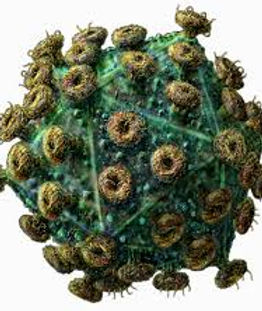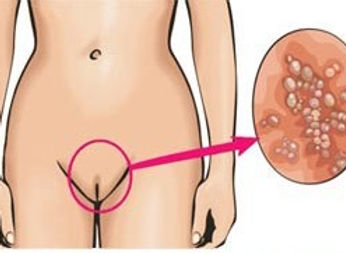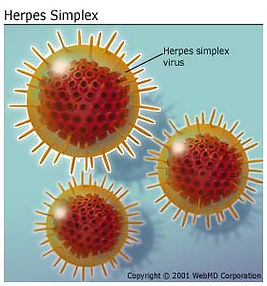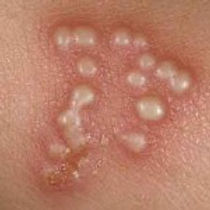K15 Magazine Presents...
All About Human Sexuality
Many of us know what STD are but what are STI?
STI stands for “sexually transmitted infection”, which is a bit different as compared to an STD (sexually transmitted disease). Some people think this newer term helps minimize stigma around these illnesses. It’s less harsh to talk about an infection as opposed to a disease, right? These two terms are often used interchangeably.
An STI is any disease or infection that can be passed down from one person to another through sexual intercourse or exchange of bodily fluids, such as blood and cum.
The list of STI goes on and on, but we will be covering two common types of STI here : HIV/AIDS, and genital herpes. These are two common types of STI that you will learn about as well as how to prevent transmitting them while engaging in sexual intercourse with your partner.

an enlarged HIV viron
HIV/AIDS
HIV
HIV stands for “human immunodeficiency virus”. Let’s break it down.
Human : the virus infects human beings
Immunodeficiency : the virus weakens your immune system by destroying important cells that fight disease and infection. A "deficient" immune system cannot protect you.
Virus : an infective agent that is able to multiply only within the living cells of a host.

How Can I Get HIV?
You can get HIV from exchanging bodily fluids with a person who has the infection. Such bodily fluids include : blood, semen (cum, precum, rectal fluids, vaginal fluids, and breast milk. These bodily fluids may be exchanged during sexual intercourse (anal or vaginal intercourse), sharing needles (drug use), HIV positive mothers breastfeeding children, or blood transplants.
Even though studies conducted over the years have shown that traces of HIV were found in saliva, tears and urine, the virus in found in extremely low concentrations. Also, there has not been a single case of HIV transmission through these bodily fluids reported to date. HIV cannot be transmitted through day-to-day activities such as shaking hands, hugging, casual kissing, using a toilet seat or drinking fountain, neither can you become infected by sharing food or eating utensils with someone who is positive. Most importantly, you also cannot get HIV from mosquitoes. Phew.
How Do I know If I have HIV?
Within a month or two of HIV entering the body, 40% to 90% of people experience flulike symptoms. As the HIV begins to destroy your cells, some symptoms that you may experience include : swollen glands, fever, rash throat, fatigue, muscle or joint pains, and headaches. However, no symptoms of HIV may appear within the early stages.
How Can I Avoid Contracting HIV?
You can avoid having HIV by choosing not to have sex-which is ultimately one of the safest choices. Also, don’t kiss your partner if you both have open sores or cuts in your mouth (bleeding gums). If you do choose to engage in sexual intercourse, use a condom to avoid the exchange of bodily fluids. Oral sex is also safer as opposed to anal or vaginal sex.
Can HIV Be Cured?
ART, “antiretroviral therapy” can be used to keep the level of HIv in your body minimal. This treatment helps fight the virus, and it includes taking a combination of HIV medicines every day. There are about 14 kinds of ARV (antiretroviral drugs) that can be taken. These HIV medicines can control the virus so that you can live a longer, healthier life and reduce the risk of transmitting HIV to others. Scientists are still working very hard to find a cure up to this day.
Did you know that 33.4 million people are currently living with HIV/AIDS? But unfortunately, 60 million people have already been infected, and it has claimed 22 million lives as of 2003. Also, it is believed that HIV first originated from a species of monkey in Africa during the 1900s.
However, you shouldn’t rely only on symtoms to determine whether you are HIV positive.
The only way to know for sure if you are infected with HIV is to get tested.
You can get tested for STIs at a sexual health clinic, genitourinary medicine (GUM) clinic or GP surgery. If you or your partner have any sex with casual partners it's a good idea to get tested for STIs regularly. An annual check is a good baseline. However, the more sexual partners you have the more frequently you should get tested, eg. every 3-6 months.
There is no cure for HIV, but treatment can allow for HIV positive people to live a long, healthy life.
What is AIDS?
AIDS stands for for Acquired Immunodeficiency Syndrome, which is the final stage of HIV infection. It is important to note that not everyone who has HIV can get to this stage.
People at this stage of HIV have badly damaged immune systems, and are at a much higher risk of death. If you have AIDS, you will need to go through medical intervention and treatment.


Genital Herpes
Genital Herpes is a very contagious infection that is passed down from sexual contact. It creates painful blisters on the genitals or the surrounding area. HSV is a chronic (long term) condition that can remain in your body and become active again at unexpected times. Usually, people with genital herpes may experience the herpes recurring 4-5 times within the 2 years of being infected, Fortunately, the outbreaks will become less frequent and less severe as time goes on.
What Causes Genital Herpes?
Genital herpes are caused by one of two viruses, HSV-1, or HSV-2. .HSV-1 is spread through contact with saliva, including kissing and mouth-to-genital contact (oral sex). HSV-2 is usually passed down by direct genital-to-genital or genital-to-anal contact. Both viruses can affect the mouth or genitals. It used to be falsely believed that HSV-1 leads to an infection in the mouth, while HSV-2 infects the genitals. However, recent research shows that most cases of genital herpes are with HSV-1.
Do I Have Genital Herpes?
People do not need to show signs or symptoms to have genital herpes. However, some symptoms that may show can include pain, itching, or tingling around the genitals, small blisters on or around the penis, vagina, or anus that usually break and form small scabs before healing within a few days, a burning sensation when urinating (peeing) if the sores are near the penis or urethra.
However, it is important to remember that some people who may have contracted herpes may not experience these symptoms any time near the time they had contracted the virus. Some people may not experience these symptoms at all-making it harder to figure out whether you or your partner had contracted herpes. A good way to tell whether you had contracted herpes is by taking a clinical test, such as the PCR blood test. Talk to your family doctor for more information on where you can take this test. Don’t be afraid, your doctor will understand and it’s always better to be safe than sorry.
Is There a Cure?
Unfortunately, there is no cure for genital herpes. But there are antiviral drugs that you can take to control the outbreaks and relieve symptoms from the virus. The three types of antiviral drugs that you can take for herpes treatment are Acyclovir (Zovirax), Famcyclovir (Famvir), and Valacyclovir (Valtrex). All three types can be taken to treat both types of HSV. For severe infections, salt baths or ice packs may help reduce discomfort. You can also try applying Iodine-containing antiseptics such as Betadine on your blisters. Doing so will dry out the blisters and reduce the chances of secondary infection.
How Can I Avoid Contracting Genital Herpes?
A good way to prevent transmitting herpes is by having you and your partner visit a clinic for testing that can prove whether either one of you have contracted the virus. If one of you are infected, it would be best to stay away from any sexual activity or contact. Studies have also shown that the use of condoms and dental dams can help prevent the spread of the virus from one person to another. Avoid kissing your partner if you or your partner have blisters or open sores in your mouths.
Did you know that about one in five US teens and adults have had a genital herpes infection?
In addition, people with genital herpes have at least twice the risk of becoming infected with HIV if exposed to it than those without it. The history of herpes is not clear, and not a lot of theories have been made about how the infection has originated.



an illustration of the blisters caused by genital herpes
photo of blisters caused by genital herpes